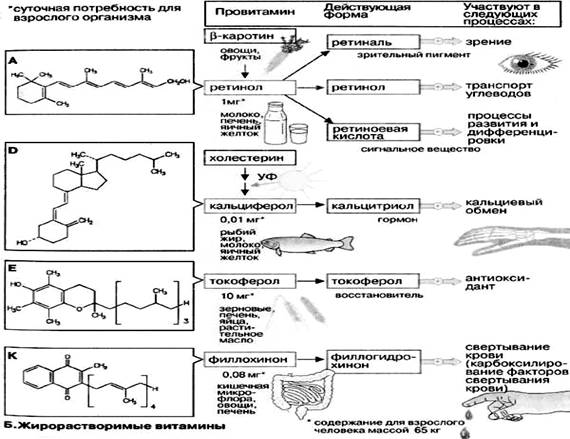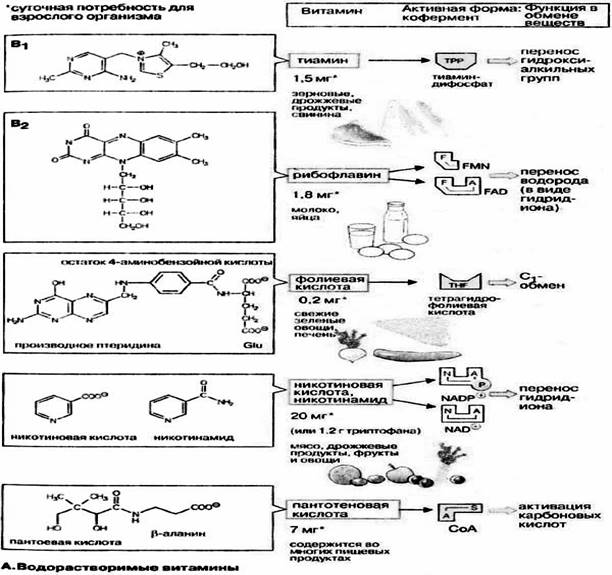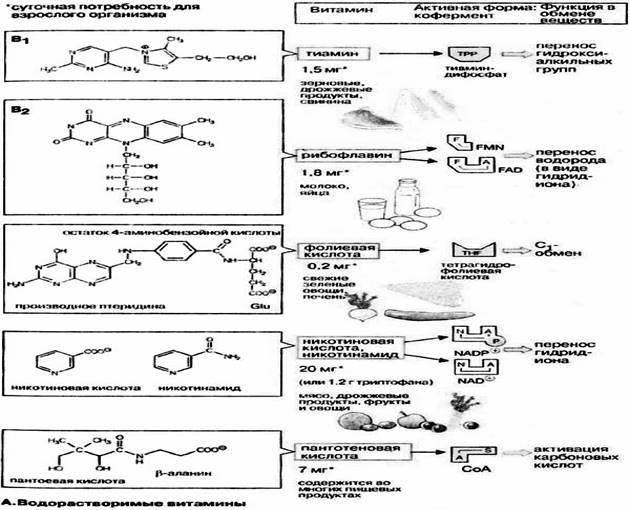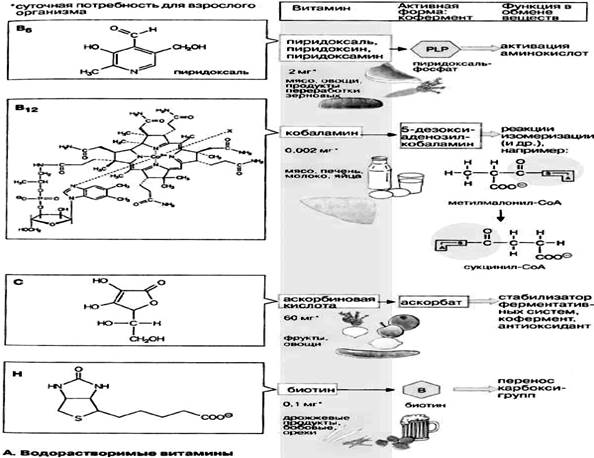Реферат по английскому языку на тему витамины
Реферат: Vitamins Essay Research Paper Vitamin any of
Vitamins Essay, Research Paper
Vitamin, any of the organic compounds required by the body in small amounts for metabolism, to protect health, and for proper growth in children. Vitamins also assist in the formation of hormones, blood cells, nervous-system chemicals, and genetic material. The various vitamins are not chemically related, and most differ in their physiological actions. They generally act as catalysts, combining with proteins to create metabolically active enzymes that in turn produce hundreds of important chemical reactions throughout the body. Without vitamins, many of these reactions would slow down or cease. The intricate ways in which vitamins act on the body, however, are still far from clear.
The 13 well-identified vitamins are classified according to their ability to be absorbed in fat or water. The fat-soluble vitamins-A, D, E, and K-are generally consumed along with fat-containing foods, and because they can be stored in the body’s fat, they do not have to be consumed every day. The water-soluble vitamins-the eight B vitamins and vitamin C-cannot be stored and must be consumed frequently, preferably every day (with the exception of some B vitamins, as noted below).
The body can manufacture only vitamin D; all others must be derived from the diet. Lack of them causes a wide range of metabolic and other dysfunctions. In the U.S., since 1940, the Food and Nutrition Board of the National Research Council has published recommended dietary allowances (RDA) for vitamins, minerals, and other nutrients. Expressed in milligrams or international units (IU) for adults and children of normal health, these recommendations are useful guidelines not only for professionals in nutrition but also for the growing number of families and individuals who eat irregular meals and rely on prepared foods, many of which are now required to carry nutritional labeling.
A well-balanced diet contains all the necessary vitamins, and most individuals who follow such a diet can correct any previous vitamin deficiencies. However, persons who are on special diets, who are suffering from intestinal disorders that prevent normal absorption of nutrients, or who are pregnant or lactating may need particular vitamin supplements to bolster their metabolism. Beyond such real needs, vitamin supplements are also often popularly believed to offer “cures” for many diseases, from colds to cancer; but in fact the body quickly eliminates most of these preparations without absorbing them. In addition, the fat-soluble vitamins can block the effect of other vitamins and even cause severe poisoning when taken in excess.
Vitamin A is a pale yellow primary alcohol derived from carotene. It affects the formation and maintenance of skin, mucous membranes, bones, and teeth; vision; and reproduction. An early deficiency symptom is night blindness (difficulty in adapting to darkness); other symptoms are excessive skin dryness; lack of mucous membrane secretion, causing susceptibility to bacterial invasion; and dryness of the eyes due to a malfunctioning of the tear glands, a major cause of blindness in children in developing countries.
The body obtains vitamin A in two ways. One is by manufacturing it from carotene, a vitamin precursor found in such vegetables as carrots, broccoli, squash, spinach, kale, and sweet potatoes. The other is by absorbing ready-made vitamin A from plant-eating organisms. In animal form, vitamin A is found in milk, butter, cheese, egg yolk, liver, and fish-liver oil. Although one-third of American children are believed to consume less than the recommended allowance of vitamin A, sufficient amounts can be obtained in a normally balanced diet rather than through supplements. Excess vitamin A can interfere with growth, stop menstruation, damage red blood corpuscles, and cause skin rashes, headaches, nausea, and jaundice.
Known also as vitamin B complex, these are fragile, water-soluble substances, several of which are particularly important to carbohydrate metabolism.
Thiamine, or vitamin B1, a colorless, crystalline substance, acts as a catalyst in carbohydrate metabolism, enabling pyruvic acid to be absorbed and carbohydrates to release their energy. Thiamine also plays a role in the synthesis of nerve-regulating substances. Deficiency in thiamine causes beriberi, which is characterized by muscular weakness, swelling of the heart, and leg cramps and may, in severe cases, lead to heart failure and death. Many foods contain thiamine, but few supply it in concentrated amounts. Foods richest in thiamine are pork, organ meats (liver, heart, and kidney), brewer’s yeast, lean meats, eggs, leafy green vegetables, whole or enriched cereals, wheat germ, berries, nuts, and legumes. Milling of cereal removes those portions of the grain richest in thiamine; consequently, white flour and polished white rice may be lacking in the vitamin. Widespread enrichment of flour and cereal products has largely eliminated the risk of thiamine deficiency, although it still occurs today in nutritionally deficient alcoholics.
Riboflavin, or vitamin B2, like thiamine, serves as a coenzyme-one that must combine with a portion of another enzyme to be effective-in the metabolism of carbohydrates, fats, and, especially, respiratory proteins. It also serves in the maintenance of mucous membranes. Riboflavin deficiency may be complicated by a deficiency of other B vitamins; its symptoms, which are not as definite as those of a lack of thiamine, are skin lesions, especially around the nose and lips, and sensitivity to light. The best sources of riboflavin are liver, milk, meat, dark green vegetables, whole grain and enriched cereals, pasta, bread, and mushrooms.
Niacin, also known as nicotinic acid and vitamin B3, also works as a coenzyme in the release of energy from nutrients. A deficiency of niacin causes pellagra, the first symptom of which is a sunburnlike eruption that breaks out where the skin is exposed to sunlight. Later symptoms are a red and swollen tongue, diarrhea, mental confusion, irritability, and, when the central nervous system is affected, depression and mental disturbances. The best sources of niacin are liver, poultry, meat, canned tuna and salmon, whole grain and enriched cereals, dried beans and peas, and nuts. The body also makes niacin from the amino acid tryptophan. Megadoses of niacin have been used experimentally in the treatment of schizophrenia, although no experimental proof has been produced to show its efficacy. In large amounts it reduces levels of cholesterol in the blood, and it has been used extensively in preventing and treating arteriosclerosis. Large doses over long periods cause liver damage.
Pyridoxine, or vitamin B6, is necessary for the absorption and metabolism of amino acids. It also plays roles in the use of fats in the body and in the formation of red blood cells. Pyridoxine deficiency is characterized by skin disorders, cracks at the mouth corners, smooth tongue, convulsions, dizziness, nausea, anemia, and kidney stones. The best sources of pyridoxine are whole (but not enriched) grains, cereals, bread, liver, avocadoes, spinach, green beans, and bananas. Pyridoxine is needed in proportion to the amount of protein consumed.
Cobalamin, or vitamin B12, one of the most recently isolated vitamins, is necessary in minute amounts for the formation of nucleoproteins, proteins, and red blood cells, and for the functioning of the nervous system. Cobalamin deficiency is often due to the inability of the stomach to produce glycoprotein, which aids in the absorption of this vitamin. Pernicious anemia results, with its characteristic symptoms of ineffective production of red blood cells, faulty myelin (nerve sheath) synthesis, and loss of epithelium (membrane lining) of the intestinal tract. Cobalamin is obtained only from animal sources-liver, kidneys, meat, fish, eggs, and milk. Vegetarians are advised to take vitamin B12 supplements.
Folic acid, or folacin, is a coenzyme needed for forming body protein and hemoglobin. Recent investigations show that folic acid deficiency may be responsible for neural tube defects, a type of birth defect that results in severe brain or neurological disorders (see Spina Bifida). The U.S. Public Health Service recommends that women of child-bearing age take 0.4 mg of folic acid daily. Women should continue to take that dose through the first three months of pregnancy. Folic acid is effective in the treatment of certain anemias and sprue. Dietary sources are organ meats, leafy green vegetables, legumes, nuts, whole grains, and brewer’s yeast. Folic acid is lost in foods stored at room temperature and during cooking. Unlike other water-soluble vitamins, folic acid is stored in the liver and need not be consumed daily.
Pantothenic acid, another B vitamin, plays a still-undefined role in the metabolism of proteins, carbohydrates, and fats. It is abundant in many foods and is manufactured by intestinal bacteria as well.
Biotin, a B vitamin that is also synthesized by intestinal bacteria and widespread in foods, plays a role in the formation of fatty acids and the release of energy from carbohydrates. Its deficiency in humans is unknown.
Vitamin C, or Ascorbic Acid
This well-known vitamin is important in the formation and maintenance of collagen, the protein that supports many body structures and plays a major role in the formation of bones and teeth. It also enhances the absorption of iron from foods of vegetable origin. Scurvy is the classic manifestation of severe ascorbic acid deficiency. Its symptoms are due to loss of the cementing action of collagen and include hemorrhages, loosening of teeth, and cellular changes in the long bones of children. Assertions that massive doses of ascorbic acid prevent colds and influenza have not been borne out by carefully controlled experiments (see Cold, Common). In other experiments, however, ascorbic acid has been shown to prevent the formation of nitrosamines-compounds found to produce tumors in laboratory animals and possibly also in humans. Although unused ascorbic acid is quickly excreted in the urine, large and prolonged doses can result in the formation of bladder and kidney stones, interference with the effects of blood-thinning drugs, destruction of B12, and the loss of calcium from bones. Sources of vitamin C include citrus fruits, fresh strawberries, cantaloupe, pineapple, and guava. Good vegetable sources are broccoli, brussel sprouts, tomatoes, spinach, kale, green peppers, cabbage, and turnips.
This vitamin is necessary for normal bone formation and for retention of calcium and phosphorus in the body. It also protects the teeth and bones against the effects of low calcium intake by making more effective use of calcium and phosphorus. Also called the sunshine vitamin, vitamin D is obtained from egg yolk, liver, tuna, and vitamin-D fortified milk. It is also manufactured in the body when sterols, which are commonly found in many foods, migrate to the skin and become irradiated. Vitamin D deficiency, or rickets, occurs only rarely in tropical climates where sunlight is abundant, but it was once common among children of northern cities before the use of vitamin D-fortified milk. Rickets is characterized by deformities of the rib cage and skull and by bowlegs, due to failure of the body to absorb calcium and phosphorus. Because vitamin D is fat-soluble and stored in the body, excessive consumption can cause vitamin poisoning, kidney damage, lethargy, and loss of appetite.
The role of vitamin E in the human body is not clearly established, but it is known to be an essential nutrient in more than 20 vertebrate species. The vitamin plays some role in forming red blood cells and muscle and other tissues and in preventing the oxidation of vitamin A and fats. It is found in vegetable oils, wheat germ, liver, and leafy green vegetables. Vitamin E is popularly advocated for a wide range of diseases, but no substantial evidence has been found to back these claims. Although vitamin E is stored in the body, overdoses appear to have lower toxic effects than do overdoses of other fat-soluble vitamins.
This vitamin is necessary mainly for the coagulation of blood. It aids in forming prothrombin, an enzyme needed to produce fibrin for blood clotting. The richest sources of vitamin K are alfalfa and fish livers, which are used in making concentrated preparations of this vitamin. Dietary sources include all leafy green vegetables, egg yolks, soybean oil, and liver. For a healthy adult, a normal diet and bacterial synthesis in the bowels usually are sufficient to supply the body with vitamin K and prothrombin. Digestive disturbances may lead to defective absorption of vitamin K and hence to mild disorders in blood clotting.
Ser-Esenin.ru
В помощь школьнику и студенту!
Сочинение на английском языке Витамины/ Vitamins с переводом на русский язык
На английском языке. Vitamins
In order to be healthy and active one should eat useful products. They should be vitamin rich.
Vitamins are organic elements which are very important and useful for a man. Not in vain “vitamin” means life in the translation from the Latin language. They help to normal work and human body development, tissue renewal, regular metabolism, immunity improvement. Vitamins mostly get into our organism with food, which contain necessary elements put by the nature. Fruits and vegetables contain many vitamins that’s why majority of doctors advice to eat plant food. It is necessary to cook food in such way to preserve vitamins more full. At present days there are more than 30 vitamins, they bear names of Latin letters – A, B, C, etc. It is extremely useful to eat oranges and currant that contain vitamin C, fish and caviar are rich in vitamin B, oil has vitamin E, and vitamin A one can find in carrot and eggs. Internet can help in the question of vitamin content in that or those products, that’s why today it’s easy to take care of oneself . Sometimes people suffer from avitaminosis, vitamin deficiency, which can be a reason of many illnesses. Today there is the opportunity to buy vitamins in a drugstore, to be in tonus and to keep one’s organism from illnesses. However one shouldn’t overestimate the value of synthetical vitamins and to refuse natural, it’s better to combine them. Speaking about vitamin role, it is necessary to remember that there no life without vitamins.
Перевод на русский язык. Витамины
Чтобы быть здоровым, активным, нужно есть полезные продукты. Они должны быть богаты витаминами.
Витамины – это органические вещества, которые очень важны и полезны для человека. Недаром в переводе с латинского «витамины» значит жизнь. Они помогают нормальной работе и развитию человеческого организма, обновлению тканей, правильному обмену веществ и повышению иммунитета. Витамины попадают к нам в организм в основном с пищей, которая содержит заложенные в нее природой необходимые элементы. Большое количество витамин содержатся в овощах и фруктах, именно поэтому врачи часто рекомендуют кушать больше растительной пищи. Необходимо готовить пищу, чтобы сохранять как можно полнее содержащиеся в ней витамины. В настоящее время известно свыше 30 различных витаминов, для удобства они носят названия латинских букв – A, B, C и т.д. Крайне полезны апельсины и смородина, содержащие витамин С, рыба и икра богаты витамином В, в растительном масле есть витамин Е, а витамин А можно найти в моркови и яйцах. Интернет может помочь в вопросе содержания витамин в тех или иных продуктах, поэтому на сегодняшний день, намного проще следить за здоровьем самостоятельно. Иногда люди страдают авитаминозом, нехваткой витаминов, что может стать причиной многих заболеваний. Сегодня есть возможность приобрести витамины в аптеке, чтобы быть в тонусе и защитить свой организм от болезней. Однако не стоит переоценивать значение синтетических витамин и не отказываться от природных, лучше их сочетать. Говоря о роли витаминов, важно помнить, что без витаминов нет самой жизни.
Витамины/ Vitamins
| На английском языке | Перевод на русский язык |
| Vitamins | Витамины |
| In order to be healthy and active one should eat useful products. They should be vitamin rich. Vitamins are organic elements which are very important and useful for a man. Not in vain “vitamin” means life in the translation from the Latin language. They help to normal work and human body development, tissue renewal, regular metabolism, immunity improvement. Vitamins mostly get into our organism with food, which contain necessary elements put by the nature. Fruits and vegetables contain many vitamins that’s why majority of doctors advice to eat plant food. It is necessary to cook food in such way to preserve vitamins more full. At present days there are more than 30 vitamins, they bear names of Latin letters – A, B, C, etc. It is extremely useful to eat oranges and currant that contain vitamin C, fish and caviar are rich in vitamin B, oil has vitamin E, and vitamin A one can find in carrot and eggs. Internet can help in the question of vitamin content in that or those products, that’s why today it’s easy to take care of oneself. Sometimes people suffer from avitaminosis, vitamin deficiency, which can be a reason of many illnesses. Today there is the opportunity to buy vitamins in a drugstore, to be in tonus and to keep one’s organism from illnesses. However one shouldn’t overestimate the value of synthetical vitamins and to refuse natural, it’s better to combine them. Speaking about vitamin role, it is necessary to remember that there no life without vitamins. | Чтобы быть здоровым, активным, нужно есть полезные продукты. Они должны быть богаты витаминами. Витамины – это органические вещества, которые очень важны и полезны для человека. Недаром в переводе с латинского “витамины” значит жизнь. Они помогают нормальной работе и развитию человеческого организма, обновлению тканей, правильному обмену веществ и повышению иммунитета. Витамины попадают к нам в организм в основном с пищей, которая содержит заложенные в нее природой необходимые элементы. Большое количество витамин содержатся в овощах и фруктах, именно поэтому врачи часто рекомендуют кушать больше растительной пищи. Необходимо готовить пищу, чтобы сохранять как можно полнее содержащиеся в ней витамины. В настоящее время известно свыше 30 различных витаминов, для удобства они носят названия латинских букв – A, B, C и т. д. Крайне полезны апельсины и смородина, содержащие витамин С, рыба и икра богаты витамином В, в растительном масле есть витамин Е, а витамин А можно найти в моркови и яйцах. Интернет может помочь в вопросе содержания витамин в тех или иных продуктах, поэтому на сегодняшний день, намного проще следить за здоровьем самостоятельно. Иногда люди страдают авитаминозом, нехваткой витаминов, что может стать причиной многих заболеваний. Сегодня есть возможность приобрести витамины в аптеке, чтобы быть в тонусе и защитить свой организм от болезней. Однако не стоит переоценивать значение синтетических витамин и не отказываться от природных, лучше их сочетать. Говоря о роли витаминов, важно помнить, что без витаминов нет самой жизни. |
Related topics:
Перевод слова vitamin Vitamin – витамин Перевод слова Vitamin tablets – витамины в таблетках vitamin D – витамин D vitamin-deficient medium – среда с недостатком витаминов He took megadoses of Vitamin C. Он. .
Taking Vitamins and Supplements The last time I went to the doctor for a Checkup, she told me that I needed to start taking some Dietary supplements that had the Vitamins and Minerals that. .
Здоровая пища/ Healthy Food На английском языке Перевод на русский язык Healthy Food Здоровая пища It’s very important to choose the right food nowadays. Healthy and balanced diet is useful for every person. We. .
Фрукты/ Fruit На английском языке Перевод на русский язык Fruit Фрукты My name is Rita and I’m 13 years old. I’d like to tell you about my favourite food and dishes. That. .
Перевод слова butter Butter – масло Перевод слова Salted butter – соленое масло whipped butter – сбитое масло to fry in butter – жарить на масле The Butter had a twang. Масло имело. .
Перевод идиомы go to waste, значение выражения и пример использования Идиома: go to waste Перевод: быть истраченным понапрасну, быть испорченным Пример: I did not want the extra food to go to waste so I invited my friend to visit. Я. .
Food what do you eat – Еда что ты ешь Food is an essential part of our daily life. One famous English saying goes “We are what we eat”, and it’s true. The food we eat can influence our body. .
Перевод слова vegetable Vegetable – овощ, растительный, овощной Перевод слова Vegetable existence – растительная жизнь, лишенная духовных интересов vegetable casserole – овощная запеканка vegetable garden – огород The Vegetable soup was rather bland. .
Диалог на английском языке с переводом “В аптеке (At the Pharmacy)” По-английски Перевод на русский Angela: Excuse me! Is there a pharmacy near here? Анжела: Простите! А здесь есть поблизости аптека? Passerby: Yes, there is. If you go down this street. .
Перевод слова poverty Poverty – бедность, отсутствие, нехватка Перевод слова To be reduced to abject poverty – впасть в крайнюю нищету poverty of vitamins – отсутствие витаминов poverty of intellect – недостаток ума. .
Реферат: Витамины и их значение для организма
| Название: Витамины и их значение для организма Раздел: Рефераты по химии Тип: реферат Добавлен 01:34:05 30 июля 2010 Похожие работы Просмотров: 27094 Комментариев: 23 Оценило: 32 человек Средний балл: 4.6 Оценка: 5 Скачать | Функции | Основные источники | |
| Аскорбиновая кислота (С) | 50-100 мг | Участвует в окислительно-вос-становительных процессах, повы-шает сопротивляемость организма к экстремальным воздействиям | Овощи, фрукты, ягоды. В капусте — 50 мг. В шиповнике — 30-2000 мг. |
| Тиамин, аневрин (В1) | 1,4-2,4 мг | Необходим для нормальной деятельности центральной и периферической нервной системы | Пшеничный и ржаной хлеб, крупы – овсяная, горох, свинина, дрожжи, кишечная микрофлора. |
| Рибофлавин (В2) | 1,5-3,0 мг | Участвует в окислительно-восстановительных реакциях | Молоко, творог, сыр, яй-цо, хлеб, печень, овощи, фрукты, дрожжи. |
| Пиридоксин (В6) | 2,0-2,2 мг | Участвует в синтезе и метаболиз-ме аминокислот, жирных кислот и ненасыщенных липидов | Рыба, фасоль, пшено, картофель |
| Никотиновая кислота (РР) | 15,0-25,0 мг | Участвует в окислительно-восста-новительных реакциях в клетках. Недостаточность вызывает пеллагру | Печень, почки, говядина, свинина, баранина, рыба, хлеб, крупы, дрожжи, кишечная микрофлора |
| Фолиевая кислота, фолицин (Вс) | 0,2-0,5 мг | Кроветворный фактор, участвует в синтезе аминокислот, нуклеиновых кислот | Петрушка, салат, шпи-нат, творог, хлеб, печень |
| Цианкобаламин ( В12) | 2-5 мг | Участвует в биосинтезе нуклеино-вых кислот, фактор кроветворения | Печень, почки, рыба, говядина, молоко, сыр |
| Биотин (Н) | 0,1-0,3 мг | Участвует в реакциях обмена аминокислот, липидов, углеводов, нуклеиновых кислот | Овсяная крупа, горох, яйцо, молоко, мясо, печень |
| Пантотеновая кислота (В3) | 5-10 мг | Участвует в реакциях обмена белков, липидов, углеводов | Печень, почки, гречка, рис, овес, яйца, дрожжи, горох, молоко, кишечная микрофлора |
| Ретинол (А) | 0,5-2.5 мг | Участвует в деятельности мемб-ран клеток. Необходим для роста и развития человека, для функцио-нирования слизистых оболочек. Участвует в процессе фоторецепции — восприятии света | Рыбий жир, печень трески, молоко, яйца, сливочное масло |
| Кальциферол (D) | 2,5-10 мкг | Регуляция содержания кальция и фосфора в крови, минерализация костей, зубов |



